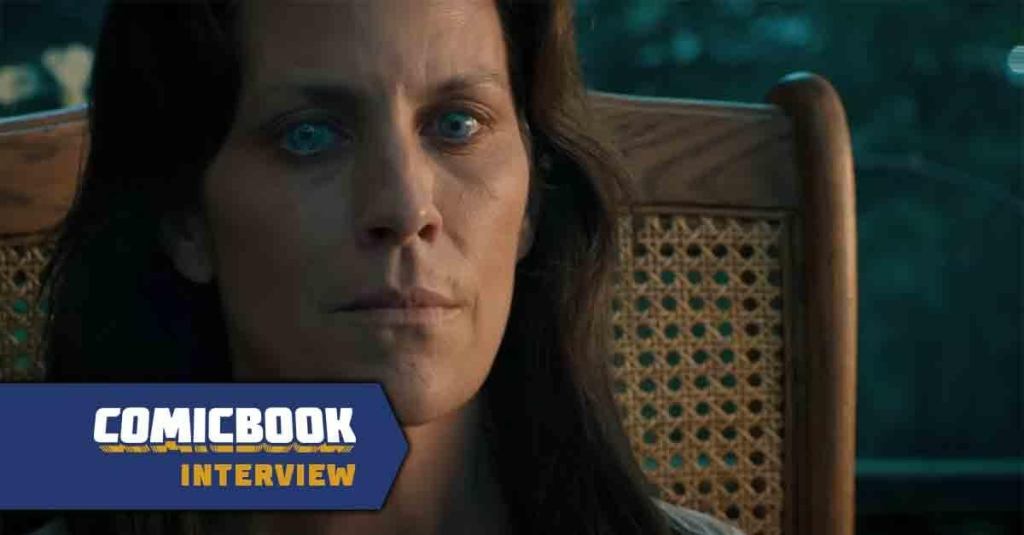Anne Rice’s Mayfair Witches introducing viewers not only to Rowan Fielding, a young neurosurgeon who, unbeknownst to her, is actually a powerful witch and the latest in a line of witches from a powerful family in New Orleans but to her biological mother, Dierdre. Played as an adult by Annabeth Gish, this week’s episode “The Dark Place” brings Deirdre and Rowan’s stories closer together with the two women bound not only by blood, but by the sinister entity Lasher (Jack Huston) as well. ComicBook.com spoke with Gish about this week’s episode, breaking down Deirdre’s tragic story.
Videos by ComicBook.com
Warning: spoilers for the second episode of Anne Rice’s Mayfair Witches, “The Dark Place”, beyond this point.
In the episode, after Dr. Lamb continues to surreptitiously skip giving Deirdre her Thorazine shots, and at Lasher’s encouragement, Deirdre wakes up and escapes the Mayfair House. She goes to Cortland’s and uses magic to see through Lasher’s eyes and find Rowan’s location — and it turns out Rowan is in New Orleans. Deirdre makes her way to Rowan’s hotel intent on meeting her daughter for the first time, but just as the two come face to face, Deirdre collapses, her throat mysteriously slit. It’s a tragic turn of events for the woman who spent so much of her life sedated.
Nicole Drum, ComcBook.com: When we first meet Deirdre — in both the book and the series — she’s being kept sedated, but we also know she’s not alone because Lasher is with her. How would you describe her mental state and her relationship with Lasher in the series when we first meet her?
Annabeth Gish: I think given that when we meet my characterization of Deirdre, she is just on the verge of waking up, the doctor is soon to approach, all these who will remove the sedation and the veil of the Thorazine, but that’s also part and parcel with Lasher. They have been in this liminal space waiting for Rowan to find them and to come. So, I think it’s a precarious place, I think it’s an anticipatory place. She’s lived suppressed, but also so ready to wake up, and it makes me happy to think that Lasher was there with her, so she wasn’t just completely alone, but at the same time, she’s been working with this force of darkness, stuck with it. So, I think the release of that energy is a good thing.
In episode two, we do get to see her wake up and leave. It’s beautifully done. What do you feel drives Deirdre in what must be that deeply disorienting but also really satisfying moment for her?
It’s so beautiful. Slow motion makes everything beautiful, and rose petals, it just is a beautiful moment. I think playing it was also, it was just as you would imagine. It’s the waking up of the senses, the feeling of the elements, and the heartbreak that is inherent in a woman who’s been lost to herself and to the world for 18 years. It’s so heartbreaking, but then exhilarating at the opportunities. First, she’s awake, second, she is about to find her daughter. So, it’s a portentous moment that I think is full of all sorts of possibilities.
There’s also that moment when she’s in her room and she’s awake and she’s with Lasher and she throws the snow globe across the room, and you get this first sense of how powerful she is. That kind of feels like a turning point.
Indeed, and I think it’s a perfect parallel to the power that Rowan has. What do you do with rage and power and how do you channel it when it’s been suppressed? Even for Rowan, obviously Deirdre’s been oppressed, suppressed, repressed, all of it medically, medicated, but Rowan has been repressed by not knowing the truth of her legacy. And yet, she can kill people when her rage arises. So, it really is a beautiful metaphor for how do women learn to be empowered and hold their anger and hold their darkness along with their light for good?
It’s also interesting because you see Deirdre as this, she’s obviously a very strong-willed, powerful woman, but she’s also being manipulated and gaslit at every turn by the people around her. Not just Carlotta, but in a sense Lasher as well, because both of them have the same goal. It’s Rowan. For very different reasons.
Yes, it’s funny, my husband and I were just talking about how the word gaslighting is so prevalent nowadays, and it’s so true in this story. Even Cortland is lying and manipulating the truth. And some people, like Carlotta may think she’s doing it for the good, for the best interest of Rowan or Deirdre, but she’s wrong.
There are also some really memorable moments in episode two … we get to see so many layers and how it echoes between Deirdre and Rowan. But we get that sex scene with Lasher and then that confrontation with Carlotta not too long after. What does it mean for Deirdre to be taking back her power?
I think Anne Rice, she was famous for her erotic literature. So, it’s inherent in her storytelling that there is a power in sexual desire and in sexual release. The scene when Rowan is on an airplane and Deirdre is in her bed and either imagining she’s having sex or not, but I think it really is just such a beautiful parallel between a real physical awakening with both a mental and then an embodied awakening of one’s own power, the release of that power.
And then of course she basically tells Carlotta, “No, we’re done here.” I think that’s also a really powerful moment too, because again, a lot of times it’s women who hold women back. And I think there’s a lot that to be said in that moment as well, granted for very different reasons.
Yes, yes, and we have to acknowledge that truth with both appropriate compassion and forgiveness. Carlotta, she doesn’t think she’s doing anything wrong, but she is, horribly. So, yes, you have to have empathy for people who are trying to keep people small, along with the appropriate rage to fight back and say, “No, I’m breaking this system. The system is broken.”
Then, of course, we get to the episode’s ending which I was not expecting. Did you know from the start that that was how it was going to go for Deirdre?
No, I didn’t, and it’s one of the most frustrating aspects as an actor. Your fate is decided, and you read it in the scripts. I knew in essence that I knew that it was a short-lived performance, but it’s also, Esta does such a great job, and the writers, of finishing her right at the peak of her potential. Like, “Oh my God, she’s about to see her daughter, she’s about to be reunited,” and the vagueness of that. It’s just so unrequited and, again, so tragic. Deirdre is just brutalized. Her lie has just been constrictions and hell. She’s a real tragic figure in the Anne Rice universe.
Anne Rice’s Mayfair Witches airs Sundays at 9/8c on AMC and AMC+.
This interview has been lightly edited for length and clarity.









